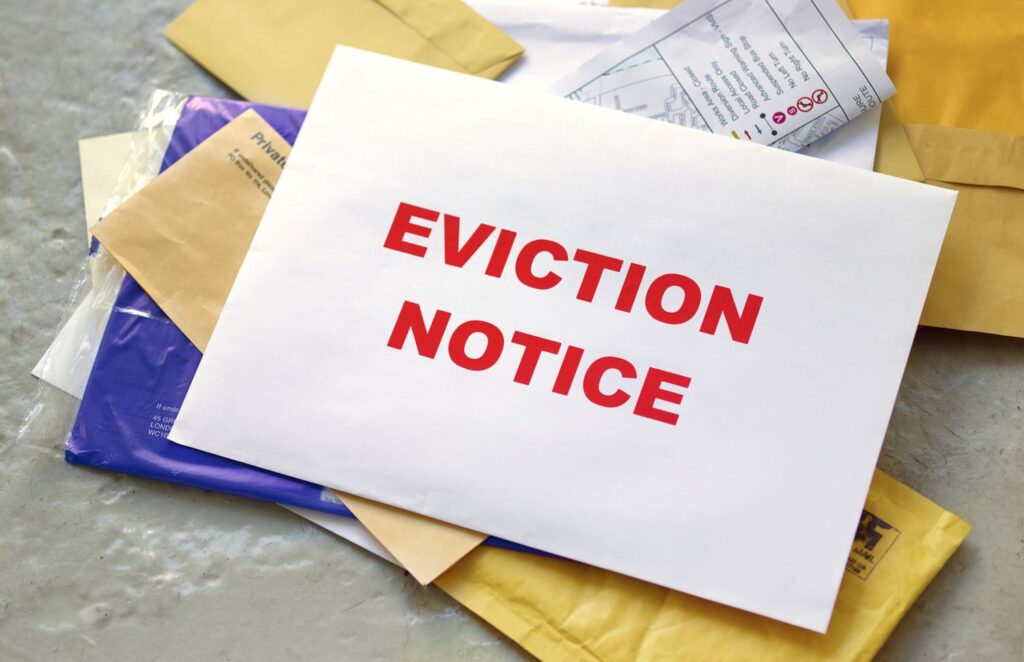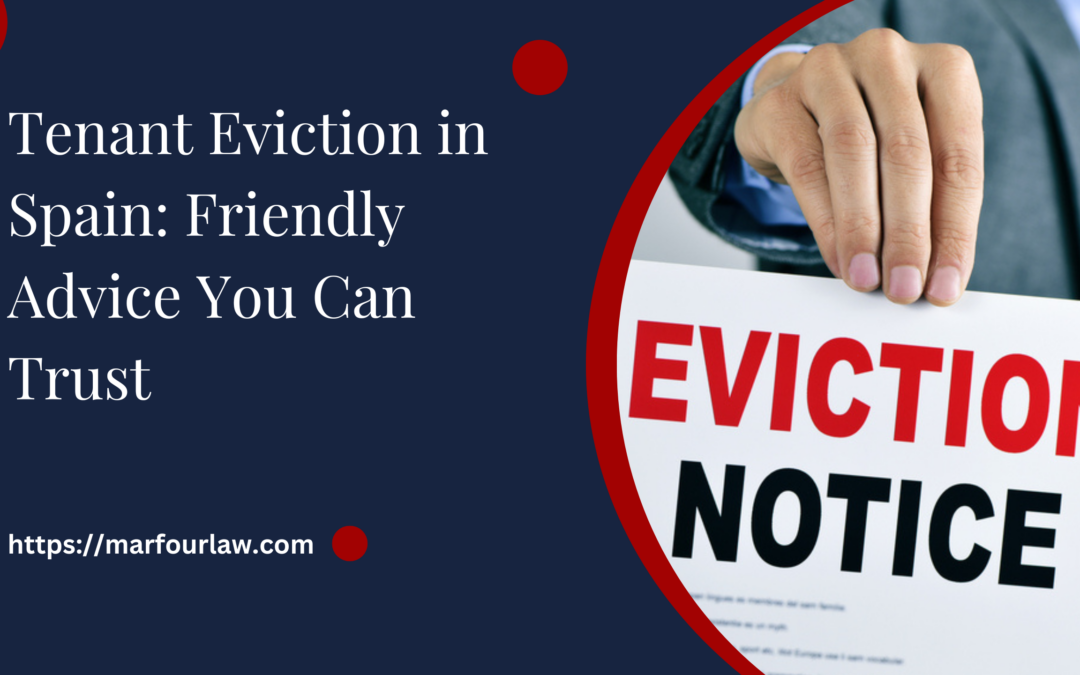Tenant eviction in Spain can be tricky, but understanding the basics can make it easier. Knowing your rights and the steps involved in Spain evictions is essential whether you’re a landlord or a tenant.
The eviction process in Spain has specific rules that both parties must follow, ensuring fairness and clarity. By being informed about eviction in Spanish law, you can handle the situation more smoothly and avoid common pitfalls.
Tenant Eviction in Spain: Simplifying the Legal Steps
Evicting a tenant in Spain involves a legal process that landlords must follow to ensure they adhere to the country’s laws while protecting their rights as property owners. Below is a detailed breakdown of each step involved in the eviction process:
1: Providing Notice
Before landlords can initiate formal legal proceedings, they must notify the tenant of eviction. The notice must be in writing and delivered to the tenant by hand or certified mail. It should specify the grounds for eviction, such as non-payment of rent, breach of lease terms, or any other valid reason under Spanish law.
The notice typically provides a specific period (usually 15 days or more) for the tenant to rectify the issue, such as paying overdue rent or vacating the property voluntarily.
2: Filing a Legal Complaint
If the tenants fail to comply with the notice within the specified timeframe, landlords can proceed by filing a legal complaint with the appropriate court. This formalizes the eviction process and initiates legal proceedings.
The court with jurisdiction over the eviction process is typically located in the district where the rental property is situated. Landlords must submit documentation supporting their claim, including the initial notice served to the tenant, evidence of non-compliance or breach of lease terms, and any other relevant documents.
3: Court Hearing
Once the legal complaint is filed, the court schedules a hearing where both the landlord and the tenant can present their cases. Both parties can choose to represent themselves or hire legal representation. Landlords should have a lawyer experienced in landlord-tenant disputes to ensure their case is presented effectively.
During the hearing, the court evaluates the evidence presented and considers the arguments from both sides. Based on Spanish law and the case’s specifics, the judge decides whether eviction is justified.
4: Issuance of Eviction Order
If the court rules in favor of the landlord, an eviction order is issued. This legal document specifies the date the tenant must vacate the property. The eviction order includes details such as the reasons for eviction, the date the tenant must leave, and the consequences of failure to comply with the court’s decision.
The landlord must ensure the eviction order is properly served to the tenant. This may sometimes require assistance from a court bailiff or other authorized personnel.
5: Execution of Eviction
If the tenant still refuses to vacate the property after the specified date in the eviction order, landlords can request assistance from the authorities to enforce the eviction.
Typically, this involves notifying the local police or court bailiff to oversee the eviction process. They will coordinate with the tenant to ensure a peaceful and orderly vacation of the premises. Landlords must adhere strictly to legal procedures during the execution of eviction to avoid any potential claims of wrongful eviction or damages.
Understanding these detailed steps is crucial for landlords Guiding the eviction process in Spain. It ensures they follow legal requirements accurately, protect their rights, and handle the situation in a manner that respects both parties’ rights under Spanish law. For specific legal advice tailored to individual circumstances, landlords must consult with a qualified attorney specializing in Spanish property law.
Evicting a Tenant in Spain: Tips from Experienced Landlords
By following these steps and seeking professional guidance, landlords can navigate the tenant eviction process in Spain with clarity and compliance, minimizing complications and achieving a satisfactory resolution to tenancy disputes.

Understanding Legal Requirements:
Before embarking on the eviction process, landlords should familiarize themselves with the legal framework governing tenant evictions in Spain. This includes knowing the valid grounds for eviction, such as non-payment of rent or breach of lease terms, and understanding the procedural steps required by Spanish law. Clear documentation of lease agreements, notices served, and any communications regarding tenant violations is crucial to building a strong case during legal proceedings.
Serve a Formal Notice:
Initiating eviction proceedings begins with serving the tenant a formal notice detailing the reasons for eviction and actions required to rectify the situation. This notice must comply with Spanish legal standards. It is typically delivered through certified mail or hand-delivered and has a specified response period, usually ranging from 15 days to one month, depending on the circumstance.
Consult with an Attorney:
Seeking legal advice from an experienced attorney specializing in landlord-tenant disputes and Spanish property law is highly advisable. Legal counsel ensures landlords fully understand their rights and obligations throughout eviction. Furthermore, having legal representation during court proceedings enhances the landlord’s ability to navigate complex legal procedures effectively and present their case convincingly.
Initiate Legal Proceedings:
If the tenant fails to comply with the notice within the specified timeframe, landlords can proceed by filing a legal complaint with the appropriate court. This formalizes the eviction process and involves submitting essential documentation, including the initial notice served and evidence supporting the grounds for eviction. The court will schedule a hearing where both parties present their arguments, and the judge evaluates the evidence before ruling.
Execute the Eviction Order:
Upon receiving a favorable court decision, an eviction order specifies the deadline by which the tenant must vacate the premises. Landlords must ensure proper legal service of the eviction order to the tenant. Suppose the tenant still refuses to vacate by the specified date. In that case, landlords can enlist court bailiffs or local authorities to enforce the eviction order and oversee the tenant’s lawful eviction.
Spain’s Tenant Eviction Process: Common Pitfalls and Solutions
In Spain, tenant eviction follows a legal process that landlords must adhere to, ensuring compliance with local laws and regulations. Here’s a breakdown of landlords’ common challenges and practical solutions to navigate them effectively, aligned with Marfour International Law principles.

Legal Requirements and Timelines
Landlords must follow specific legal steps outlined in Spanish law to initiate eviction proceedings. These include serving formal notices to tenants and adhering to court-set timelines.
Familiarize yourself with the exact legal requirements and timelines to avoid delays or legal setbacks. Consult with a legal expert if needed to ensure compliance with local laws and regulations, as recommended by Marfour International Law, which emphasizes precision in legal proceedings.
Tenant Non-Payment of Rent
One of the most common reasons for eviction is non-payment of rent. Landlords may face difficulties when tenants fail to pay on time or refuse to vacate despite overdue rent.
Maintain clear records of rent payments and communicate promptly with tenants regarding any payment issues. Consider offering payment plans or negotiating a resolution before pursuing legal action, in line with Marfour International Law’s approach to fostering cooperative resolutions.
Tenant Rights and Protections
Spanish law provides certain protections for tenants, which can complicate eviction proceedings. Tenants may invoke rights related to habitability, lease terms, or procedural errors in the eviction process.
Understand tenant rights thoroughly and ensure all eviction procedures are legally sound. Provide proper notice and documentation to mitigate potential disputes over tenant protections, adhering to Marfour International Law’s advocacy for fair and lawful practices.
Lengthy Court Proceedings
Eviction cases in Spain can sometimes be prolonged due to court backlogs or tenant appeals, causing frustration and financial strain for landlords seeking a timely resolution.
Initiate eviction proceedings as soon as legally permissible to prepare for possible delays. Keep communication channels open with tenants to encourage voluntary compliance and minimize court involvement, a strategy recommended by Marfour International Law for efficient dispute resolution.
Property Damage or Abandonment
In some cases, tenants may abandon the property or cause significant damage, complicating the eviction process and adding to landlord expenses.
Conduct regular property inspections and maintain open communication with tenants to identify issues early. Document any damages thoroughly and seek legal advice from Marfour International Law experts on recovering costs through eviction procedures, ensuring adherence to legal frameworks.
FAQs (Frequently Asked Questions)
Can I evict a tenant in Spain without a legal process?
No, Spanish law requires landlords to follow specific legal procedures for eviction, including serving formal notices and obtaining court approval if necessary.
How long does the eviction process typically take in Spain?
The timeline can vary but often depends on court schedules and tenant responses. Generally, it can take several months from initiation to final resolution.
What should I do if a tenant stops paying rent?
Start by communicating with the tenant to understand the situation. Document all communications and seek legal advice on issuing formal notices and initiating eviction proceedings if necessary.
What rights do tenants have during the eviction process in Spain?
Tenants have rights to proper notice, habitable living conditions, and legal protections against unjust eviction. Landlords must respect these rights throughout the eviction process.
Conclusion
Guiding tenant eviction in Spain requires landlords to navigate legal complexities and potential challenges with clarity and preparation. Landlords can manage the eviction process by understanding the legal requirements, communicating effectively with tenants, and seeking legal advice while protecting their rights and maintaining professional relationships. Remember, each eviction case is unique, and staying informed and proactive is key to achieving a fair and successful outcome.

